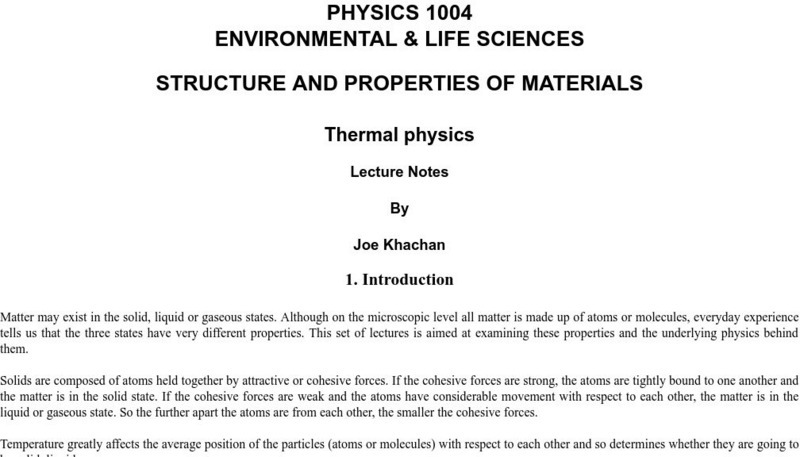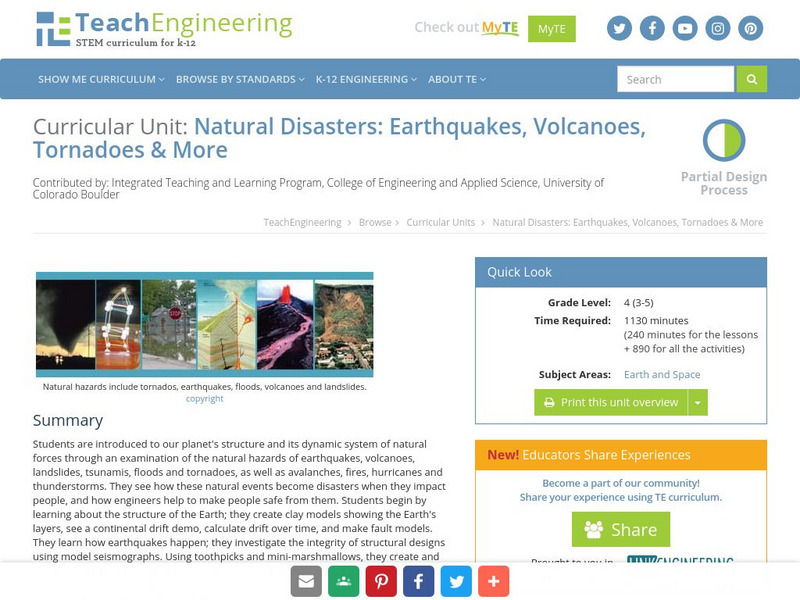Hi, what do you want to do?
Chem Tutor
Chem Tutor: Chemistry: States of Matter
This lesson focuses on the states of matter: solids, liquids, and gases. It also discusses the Kinetic Theory of Matter, Thermodynamics, Triple point, Phase Change Graphs and the Heating Curve of Water. It provideds adrawing of a heating...
National Association of Geoscience Teachers
Nagt: Demonstrating Climate Change and the Water Cycle
Demonstration of the greenhouse effect and its role in climate change, discussion of the phases of water and the water cycle, and a hands-on experiment to investigate the role of temperature in phase changes of water.
Other
Water on the Web: Studying Heat Budgets of Lakes
Interesting activity that discusses many aspects of the energy in a lake, including the evaporation of the water into gas.
University Corporation for Atmospheric Research
Ucar: Just a Phase: Water as a Solid, Liquid, and Gas
This site helps students construct a model of the arrangement of water molecules when present as solid, liquid or gas. Includes background information, lesson plans, links to standards and assessment ideas.
New York University
New York University: States of Water
Use this resource to learn about the three different phases of water; solid, liquid, and gas. What happens to water as it changes into a solid or gas? Includes short and easy to do activity.
Museum of Science
The Atom's Family: Phases of Matter
Help the Phantom choose a material and observe the changes at different temperatures in the molecule chamber. What happens to the elements or molecules as the temperature changes?
Science Buddies
Science Buddies: What's the Point of Boiling?
You know that water can exist in three separate phases: solid (ice), liquid (water), and vapor (steam). To change from one phase to another, you simply add (or remove) heat. When water boils, what happens to molecules (for example sugar...
University of Sydney (Australia)
University of Sydney: Structure and Properties of Materials/thermal Physics
An exhaustive set of "lecture notes" on various topics in thermal physics (including thermal expansion). Explanations are well done and more interesting than most. Includes both a mathematical and conceptual treatment of topics. Humor,...
Scientific American
Scientific American: What Is an Exothermic Reaction
Scientific American magazine, in the person of Dr. Gerald R. Van Hecke, gives a wonderfully complete answer to this question. Complete with very many hot words for additional background. And a wonderful NASA launch photo.
Chem Tutor
Chem Tutor: States of Matter
A very descriptive site that allows students to understand the different states of matter at the atomic level. Also discusses the process of phase changes and displays phase change graphs. Thermochemistry is also touched upon for high...
Utah Education Network
Uen: How Do You Dew?
See how the processes of condensation and evaporation occur.
Utah Education Network
Uen: Trb 4:1 Investigation 2 Why Does a Puddle Shrink?
Classroom activity helps students understand evaporation.
E-learning for Kids
E Learning for Kids: Science: Bermuda Triangle: What Is Condensation?
Cindy is at the beach learning a lot about water. Join her to explore the water cycle.
University of Maryland
University of Maryland: Boiling Water by Pumping
A page from the University of Maryland Physics Lecture Demonstration Facility. Provides directions for a teacher demonstration which utilizes a Bell jar and vacuum pump to show the dependency of boiling point upon pressure. Shows...
University of Maryland
U. Of Maryland: Latent Heat: Ice to Water to Steam
A page from the University of Maryland Physics Lecture Demonstration Facility. Provides directions for a teacher demonstration of latent heat in the melting and vaporization process. Shows apparatus and set-up; provides suggestions....
TeachEngineering
Teach Engineering: How Cold Can You Go?
Students explore materials engineering by modifying the material properties of water. Specifically, they use salt to lower the freezing point of water and test it by making ice cream. Using either a simple thermometer or a mechatronic...
TeachEngineering
Teach Engineering: Natural Disasters
Students are introduced to our planet's structure and its dynamic system of natural forces through an examination of the natural hazards of earthquakes, volcanoes, landslides, tsunamis, floods and tornados, as well as avalanches, fires,...
Center of Science and Industry
Cosi Columbus: Can You Stand the Pressure
Science experiment that demonstrates the four states or phases of matter: solid, liquid, gas, and plasma. Includes full list of materials, procedures, and scientific explanation of how you change water from a liquid state to a gaseous...
Other
Science Alive: Melting Point Simulation
Percy Julian and Josef Pikl used the fact that melting point-the temperature at which a substance changes from a solid to a liquid-is a characteristic property of a substance to prove that the British chemist Robert Robinson could not...
















